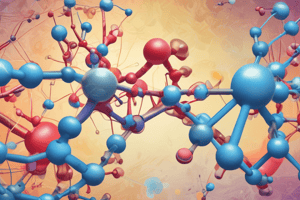Podcast
Questions and Answers
What is the term used to describe the delocalisation of electrons of a bond?
What is the term used to describe the delocalisation of electrons of a bond?
- Electromeric effect
- Inductive effect
- Resonance
- Hyperconjugation (correct)
What type of orbitals do the electrons of a σ-bond typically interact with in hyperconjugation?
What type of orbitals do the electrons of a σ-bond typically interact with in hyperconjugation?
- Anti-bonding π-orbital
- Filled s-orbital
- Empty non-bonding p-orbital or anti-bonding σ* or π*-orbitals (correct)
- Filled non-bonding p-orbital
How does hyperconjugation differ from the electromeric effect?
How does hyperconjugation differ from the electromeric effect?
- Hyperconjugation occurs in alkanes, while the electromeric effect occurs in alkenes
- Electromeric effect involves π-bonds, while hyperconjugation involves σ-bonds
- Hyperconjugation is a permanent effect, while the electromeric effect is temporary (correct)
- Electromeric effect results in the formation of a new compound, while hyperconjugation does not
Flashcards
Hyperconjugation?
Hyperconjugation?
Delocalization of electrons of a bond.
Orbitals in Hyperconjugation?
Orbitals in Hyperconjugation?
Empty non-bonding p-orbital or anti-bonding σ* or π*-orbitals.
Hyperconjugation vs. Electromeric Effect?
Hyperconjugation vs. Electromeric Effect?
Hyperconjugation is permanent, electromeric effect is temporary.
Study Notes
Bonding and Electron Delocalization
- The term used to describe the delocalization of electrons of a bond is resonance.
Hyperconjugation
- In hyperconjugation, the electrons of a σ-bond typically interact with adjacent parallel p-orbitals.
- Hyperconjugation differs from the electromeric effect in that it involves the delocalization of electrons in a σ-bond, whereas the electromeric effect involves the delocalization of electrons in a π-bond.
Studying That Suits You
Use AI to generate personalized quizzes and flashcards to suit your learning preferences.




